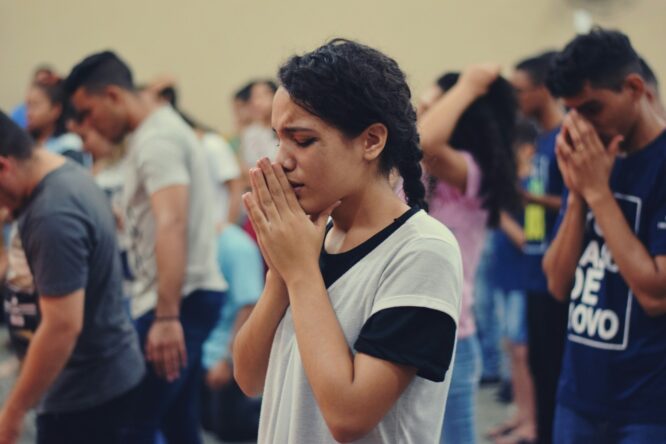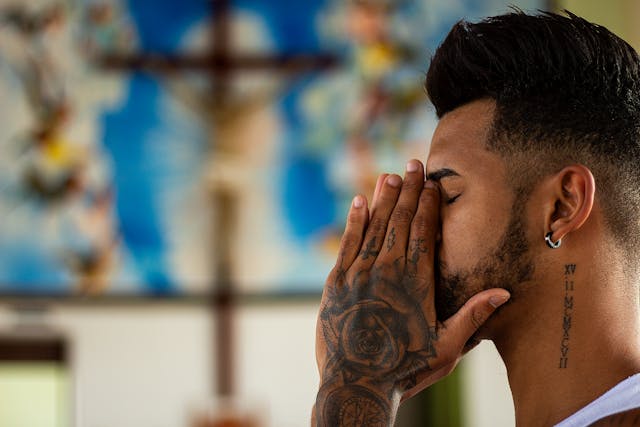People spend a lot of time arguing over what makes religions different, from beliefs and rituals to rules and who’s supposedly got it “right.”

However, if you step back a bit to see the big picture, something unexpected becomes clear: underneath all the details, most religions are actually saying a lot of the same things. The language and symbolism might change, but the heart of the message often sounds pretty familiar. Here ares some of the things most belief systems agree on, even if they come at it from different angles.
1. Compassion matters more than judgement.

Across the board, kindness shows up as a core value. Whether it’s called mercy, loving-kindness, or grace, most religions place a huge emphasis on how we treat other people, especially when they’re struggling. Choosing empathy over cruelty is the right decision every time, and no one would argue with that.
Judgement, punishment, and shame might appear in religious texts, but the deeper message often points back to compassion. Most belief systems agree that the real test of a person isn’t what they believe; it’s how they treat the people around them, especially the ones society tends to forget.
2. Forgiveness is essential.

Forgiveness shows up again and again in religious teachings, not because it’s easy, but because it’s necessary. Whether it’s framed as letting go of resentment or releasing the burden of anger, the idea is the same: you can’t move forward if you’re stuck in the past.
That doesn’t mean forgetting or excusing everything, but most religions talk about forgiveness as something that frees the person doing it. It’s more about healing your own heart than pretending nothing happened, and that’s something nearly every spiritual path can agree on.
3. The ego often gets in the way.

Whether it’s called pride, self-centredness, or attachment, the message is clear: if you let your ego run the show, you lose sight of what matters. Most religions warn against arrogance and constantly chasing recognition or power. The idea isn’t to erase yourself, but to remember you’re part of something bigger. That real, grounded humility makes space for growth. It’s hard to connect with anything greater than yourself when your whole focus is staying on top.
4. You reap what you sow.

Cause and effect shows up under different names—karma, justice, divine accountability—but the basic idea stays the same: your actions have consequences. What you put out into the world eventually finds its way back to you.
This isn’t always about punishment. Sometimes it’s as simple as the energy you bring into a room coming back to you. Be harsh, you invite harshness. Be generous, you create a ripple of good. Most faiths agree: the world responds to how you show up.
5. Love is the highest law.

For all the rules, rituals, and doctrine, most religions boil it down to one thing: love. Love your neighbour, love the divine, love the world you’re part of. It’s the thread that ties the rest together. It’s not the fluffy, feel-good version either. It’s often hard, sacrificial, and inconvenient, but the message sticks: love is the point. If your beliefs don’t lead you toward more love, most faiths would say you’ve missed something important.
6. Life is sacred.

Almost every religion teaches that life, human or otherwise, has value. Whether it’s seen as a gift from a creator, a spark of divine energy, or part of a great cycle, life isn’t something to take lightly. This belief tends to show up in how we treat other people, how we handle death, and even how we engage with nature. Even when teachings differ on the details, the sense that life carries meaning and shouldn’t be wasted is nearly universal.
7. There’s more to existence than just this.

Most religions agree that the physical world isn’t the whole picture. Whether it’s an afterlife, reincarnation, heaven, enlightenment, or just a deeper sense of spiritual reality, the message is consistent: there’s something beyond what we can see. You don’t have to have the same name for it, but nearly every faith teaches that life is part of something bigger. That idea can bring comfort, perspective, or even accountability because what we do here might echo into something more.
8. Gratitude is powerful.

Being thankful isn’t just polite, it’s transformative. Most spiritual traditions talk about gratitude as a way of staying grounded, humble, and aware of your place in the world. It’s not about pretending everything’s perfect. It’s about noticing what’s still good. Gratitude has a way of changing your relationship with life. It shifts focus from what’s missing to what’s already here. For many faiths, that change opens the door to happiness, connection, and peace of mind, even when things are tough.
9. Silence matters.

Prayer, meditation, and contemplation all involve stepping out of the noise. Most religions encourage some form of stillness, not because it looks impressive, but because it’s where clarity tends to show up. In a world that prizes constant talking, achieving, and explaining, spiritual traditions remind us to pause. To listen. To sit with ourselves and the unknown. Whether you call it prayer or just breathing deeply, silence still carries weight.
10. Community is part of the deal.

Spirituality might be personal, but it’s rarely meant to be lived out in total isolation. Most religions have some version of gathering, support, and shared practice. There’s something powerful about showing up with other people, even when it’s awkward or imperfect. Whether it’s a church, a temple, a circle, or a shared meal, most faiths understand that we need each other. Growth doesn’t happen in a vacuum. Being around people, even flawed ones, keeps us real and reminds us we’re not doing this alone.
11. The truth doesn’t always feel good.

Religious teachings aren’t just about comfort. They’re often about being called out. Most faiths include moments of reckoning, where you realise you’ve strayed, acted from fear, or ignored what matters. That discomfort is part of the process. The point isn’t shame, it’s reflection. If a belief system never challenges you, it might just be reflecting your ego back at you. Most religions agree that truth can hurt, but it also clears the path for something better.
12. Generosity changes things.

Giving shows up in nearly every tradition, not just financially, but through time, attention, food, presence. The act of offering what you have to other people is seen as sacred, and not just because it helps other people, but because it softens you, too. It doesn’t have to be grand. A small gesture done with intention often carries more weight than a showy donation. Most faiths agree that generosity, when it’s genuine, changes the giver as much as the receiver.
13. Everyone has value.

Even in traditions with hierarchy or rules, most religious teachings still insist that every person holds worth. Whether it’s seen as being made in the image of something divine, or simply being part of the same human family, the message is clear: you matter. This belief often clashes with how people behave, but it’s there in the texts, the parables, the prayers. When people live like it’s true, that every life has dignity, everything changes. Justice becomes real, and cruelty gets harder to justify.
14. The world is a reflection of how we treat it.

Many faiths speak about stewardship of the planet, of each other, and of the spaces we occupy. Whether it’s framed as divine responsibility or simply wise living, the idea is simple: what we do to the world comes back to us. From caring for animals to protecting the land to being mindful of waste, this isn’t a new idea. It’s just one we often forget, but it’s written into many religious frameworks: take care of the world, and it takes care of you.
15. Doubt isn’t failure.

It’s easy to assume that real faith means never questioning anything, but most religious traditions make room for doubt. Some even see it as part of the journey. Questioning doesn’t always mean you’re drifting. It might mean you’re paying attention. Doubt often leads to deeper understanding. If your belief system can’t survive a few hard questions, it’s not very solid. Most faiths include stories of people wrestling with belief, not just coasting through certainty.
16. You’re responsible for how you live.

Almost every religion comes back to this: what you do with your life matters. Not just what you believe, but how you move through the world. Integrity, honesty, presence are not optional extras. They’re part of the deal. Whatever the afterlife looks like, or doesn’t, most teachings focus on what you do now. With your time, your relationships, your choices. You don’t have to be perfect. But you do have to show up, and do it with intention.



